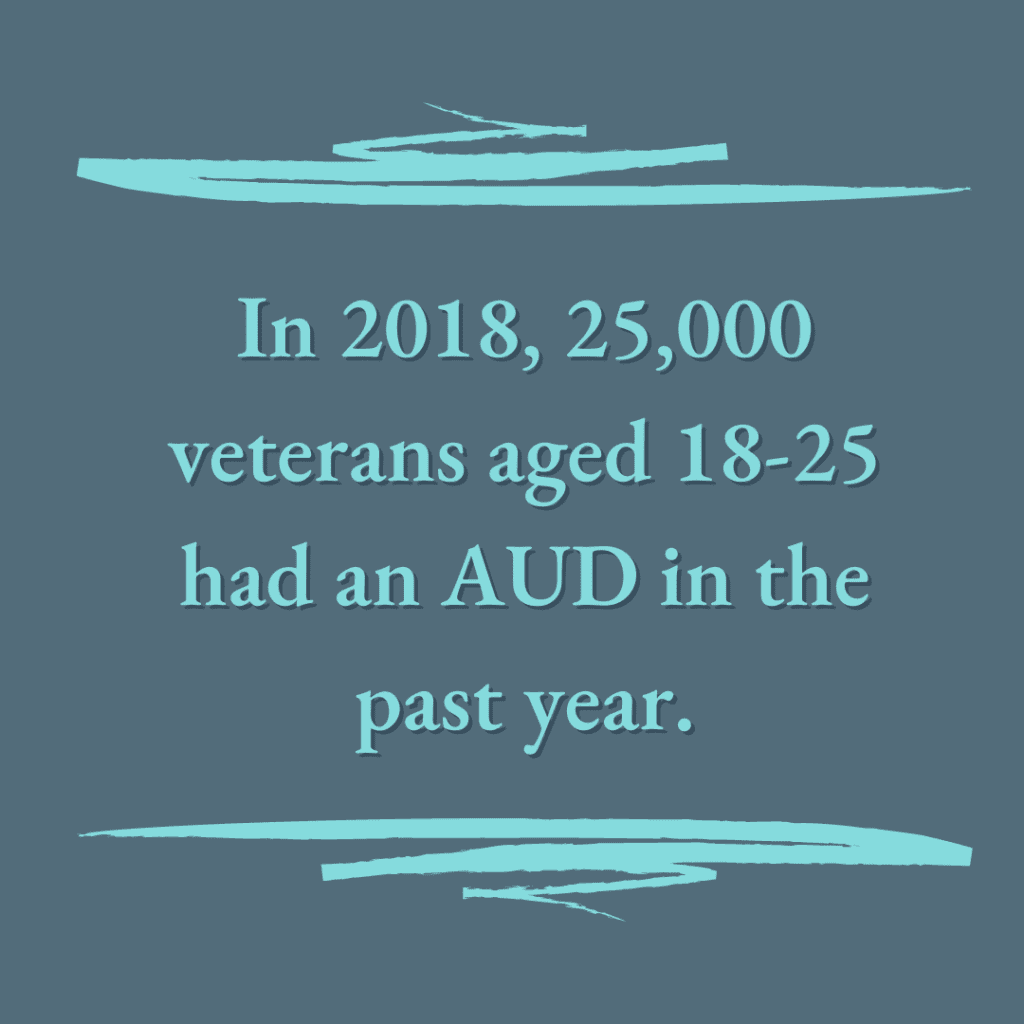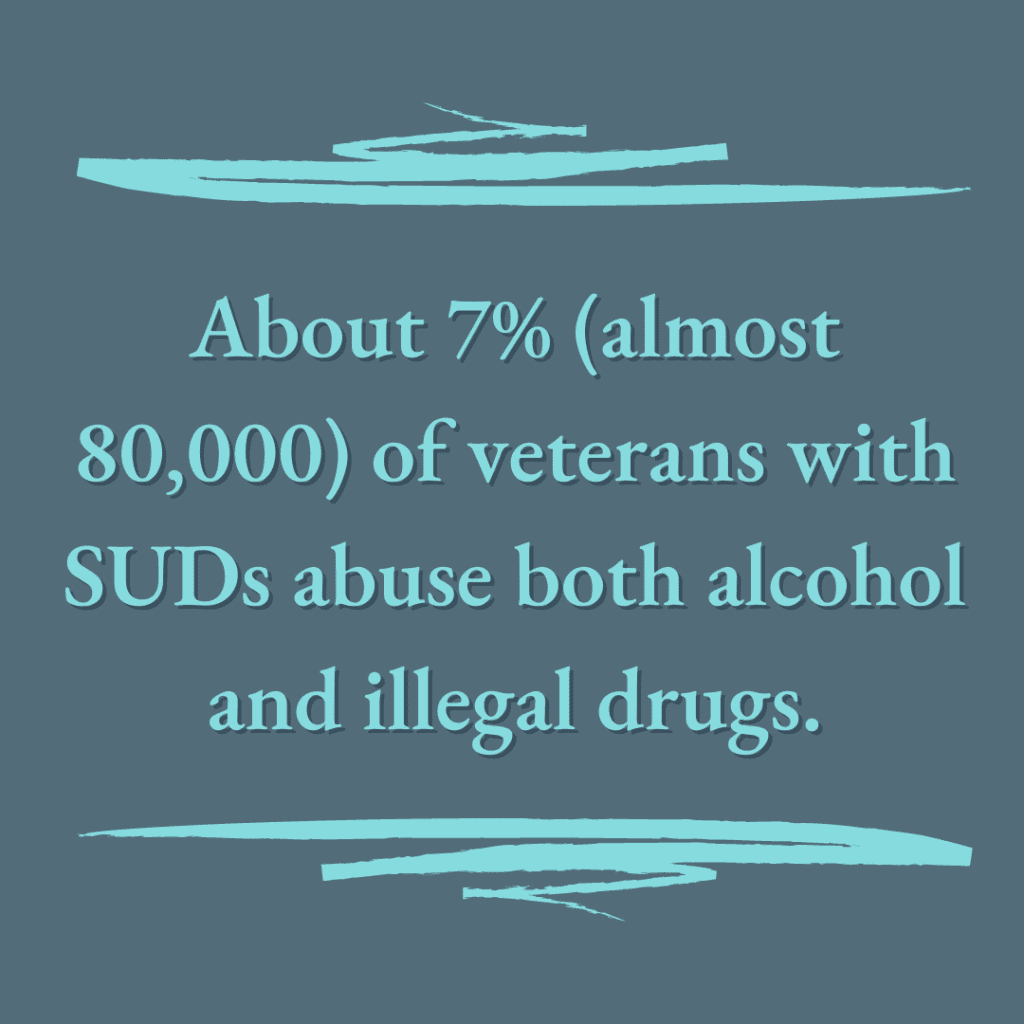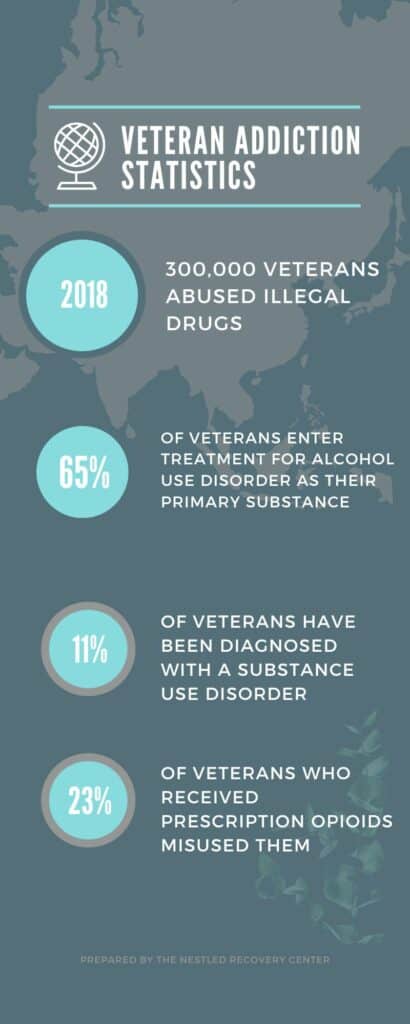For many veterans, the transition back to civilian life can be challenging and may lead to the development of substance use disorders or other addictive behaviors. At our addiction treatment center, we understand the unique experiences and challenges that veterans face, and we are committed to providing specialized care to help them overcome addiction and achieve lasting recovery.
The Nestled Recovery is designed to address the physical, emotional, and psychological needs of veterans as they navigate the journey to sobriety. We offer a range of evidence-based treatments, including therapy, counseling, and medication-assisted treatment, that are tailored to meet the individual needs of each veteran.
Data & Statistics on Substance Abuse Disorders and Mental Health Issues in Active Duty Military Personnel
Substance abuse is a significant issue among military personnel, both active duty and veterans. While the United States only has about 1 million active service members, there are over 19 million veterans living in the country, comprising about 10% of the total population. Although not all military personnel struggle with substance abuse, heavy drinking is a common problem among active duty members, and many veterans also face challenges that may lead them to consider using drugs or alcohol once they are no longer in active service.


20 Veteran Addiction Statistics
- Nearly 20 million veterans live in the United States, representing about 10% of the population.
- Approximately 11% of veterans who visit a medical facility run by the Department of Veterans Affairs (VA) for the first time have a substance use disorder (SUD).
- More than 80% (nearly 900,000) of veterans with SUDs abuse alcohol.
- Nearly 27% (about 300,000) of veterans with SUDs abuse illegal drugs.
- About 7% (almost 80,000) of veterans with SUDs abuse both alcohol and illegal drugs.
- Military veterans who struggle with substance abuse are three to four times more likely to be diagnosed with a mental health issue than those who do not misuse substances.
- Alcohol is the primary substance for 65% of veterans entering treatment centers—nearly twice the rate of civilians.
- Male veterans are more than twice as likely to be diagnosed with an alcohol use disorder (AUD) than female veterans.
- Opioid abuse is a significant problem among veterans, with one study finding that 13% of veterans who received opioids for pain management developed an opioid use disorder.
- Veterans are more likely to misuse prescription drugs than non-veterans, with one study finding that 23% of veterans who received prescription opioids misused them.
- Methamphetamine abuse is also a concern among veterans, with one study finding that 8% of veterans seeking substance abuse treatment reported methamphetamine use.
- Substance abuse among military personnel and veterans is linked to an increased risk of violence and involvement in criminal activity.
- Substance abuse among veterans is associated with a higher risk of homelessness.
- Substance abuse among veterans is linked to an increased risk of self-harm and suicide.
- Substance abuse can strain relationships with family and friends and lead to difficulties at work or in finding employment.
- Veterans with substance abuse disorders are more likely to suffer from physical health problems, including liver disease and
- Substance abuse can worsen mental health problems or lead to the development of new mental health issues among veterans.
- Substance abuse treatment programs that address co-occurring mental health disorders and underlying trauma are more effective at helping veterans recover from addiction.
- Support from loved ones and the community can be an important factor in recovery from substance abuse among veterans.

Post-traumatic stress disorder (PTSD) And The Link Between Addiction
Post-traumatic stress disorder (PTSD) is a leading cause of veteran substance abuse, and many veterans who seek treatment for substance use disorders also struggle with PTSD. In fact, more than two out of every ten veterans with PTSD also have some form of alcohol or drug addiction. Military veterans who struggle with substance abuse are three to four times more likely to be diagnosed with a mental health issue than those who do not misuse substances. Substance abuse among veterans is often linked to the use of drugs like heroin, cocaine, marijuana, and synthetic opioids. It’s important to recognize that substance abuse is not limited to younger age groups among veterans, and Substance abuse among military personnel and veterans is a significant concern.
Substance Abuse Challenges Among Military Personnel & Retired Veterans
Substance abuse can have serious consequences for those who have dedicated their lives to serving their country, and it is important to provide support and resources to help them overcome addiction and address any underlying mental health issues. Some potential consequences of substance abuse among military personnel and veterans may include:
- Difficulty readjusting to civilian life
- Relationship problems and strain on personal relationships
- Loss of employment or difficulty finding and maintaining employment
- Health issues, including physical and mental health problems
- Financial difficulties
- Increased risk of violence and involvement in criminal activity
- Increased risk of self-harm and suicide
No comments:
Post a Comment